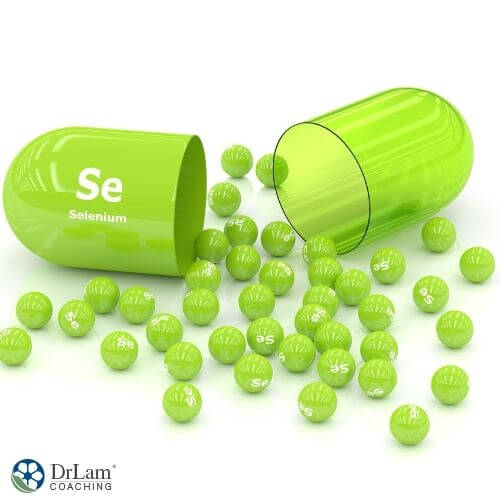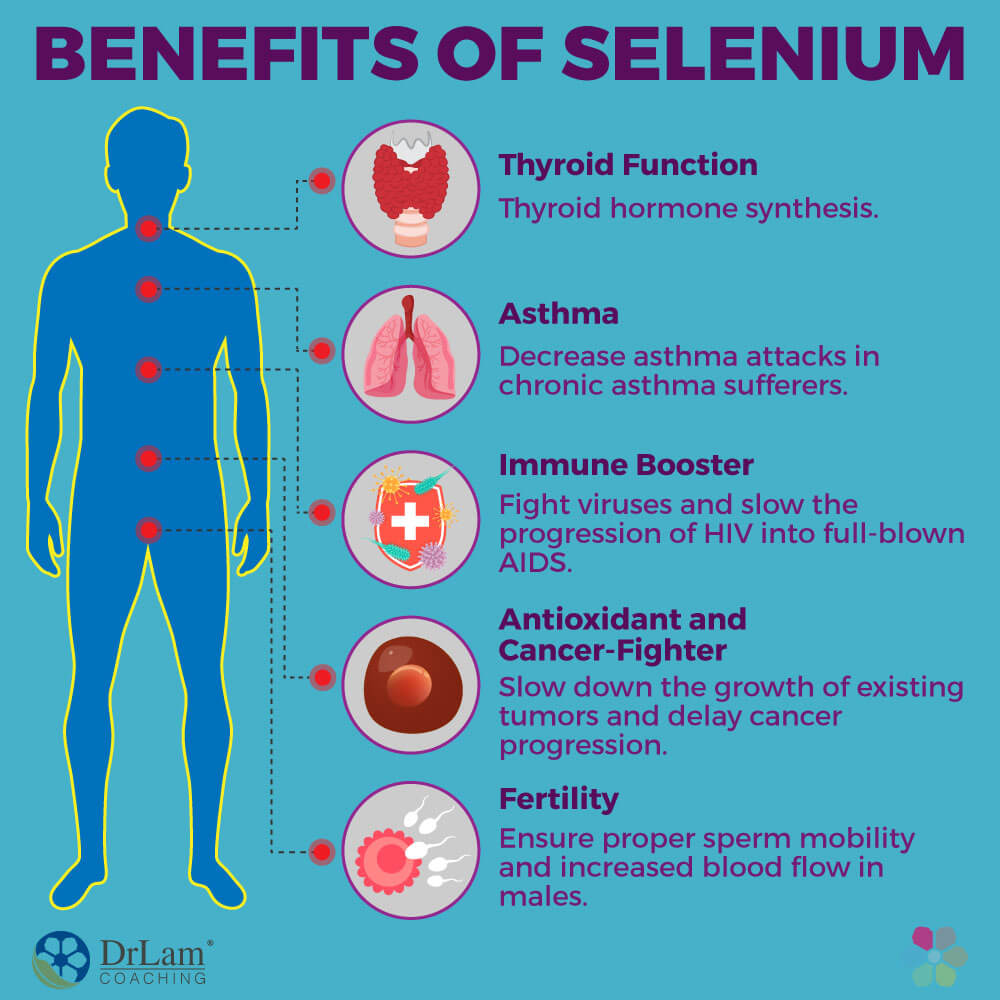 A selenium supplement may hold many benefits for those with adrenal fatigue and other health conditions. It could reduce your risk of certain cancers, heart disease, hypothyroidism, and others. We usually ingest this mineral naturally found in soil via the food we eat and the water we drink. It plays an important role in metabolic function.
A selenium supplement may hold many benefits for those with adrenal fatigue and other health conditions. It could reduce your risk of certain cancers, heart disease, hypothyroidism, and others. We usually ingest this mineral naturally found in soil via the food we eat and the water we drink. It plays an important role in metabolic function.
Many people consider taking a selenium supplement because of its strong antioxidant properties. Antioxidants protect your cells from oxidative damage caused by free radicals. But healthy people in the USA usually do not have a selenium deficiency. The exceptions include those suffering from certain health issues, such as Crohn's disease.
There is, however, no arguing about the possible benefits of taking a selenium supplement. We will look at a few of these benefits.
Low selenium levels put you at a greater risk of developing certain health issues. These include, amongst many others, thyroid issues, infertility, anxiety, heart disease, and suppressed immune function.
Your body uses selenium to make selenoproteins. These proteins have anti-inflammatory and antioxidant properties, while playing a role in thyroid hormone production. Lower selenium levels could thus potentially result in hormone imbalances. Hormone imbalance, something commonly found in those with adrenal fatigue, could result in a wide variety of health conditions.

The possible benefits of a selenium supplement include addressing these deficiencies.
Selenium is a powerful antioxidant. Antioxidants work at preventing cell damage caused by free radicals, byproducts of the metabolic process. But while free radicals play an important role in certain body processes like helping to protect us from disease, we are also exposed to free radicals from external sources. These include free radicals from the air we breathe, excessive alcohol use, and smoking, as examples. This results in a buildup of excessive free radicals that results in oxidative stress and damaged cells. The result - inflammation.
Inflammation can be a good thing; it shows your body is at work fixing an issue. It usually clears up once whatever went wrong is fixed.
Sometimes, though, inflammation does not let up. Fortunately, besides having strong antioxidant properties, selenium also has strong anti-inflammatory properties. In other words, it fights inflammation and its possible long-term effects on your body.
Your immune system’s job is to keep your body healthy. It does this by identifying and addressing different threats, like viruses, parasites, and bacteria. The antioxidant and anti-inflammatory properties of selenium help to lower oxidative stress, fight inflammation, and improve immunity.
A selenium supplement may lower your risk of developing certain types of cancer. This is due to the mineral's strong antioxidant properties that reduce DNA damage. Furthermore, selenium also boosts your immune system and may even destroy certain types of cancer cells. The types of cancer included in this regard include colon, prostate, lung, and breast cancer. Research also shows that a selenium supplement may help reduce the after-effects of radiation therapy in the treatment of certain cancers.
Asthma is a condition that affects your airways. When suffering a bout of asthma, your airways become inflamed. This causes them to narrow, resulting in wheezing, shortness of breath, coughing, and tightness in your chest area. The condition is associated with oxidative stress and inflammation.
Studies indicate that a selenium supplement may benefit those with asthma due to its powerful anti-inflammatory properties. Interestingly, research shows that many asthmatics tend to have lower blood selenium levels. One study even shows that by taking a selenium supplement, those taking part could reduce their use of corticosteroid medications for controlling the condition.
 Many mental health issues have an element of oxidative stress. Oxidative stress, for example, is believed involved in the onset as well as the progression of neurological issues that include Alzheimer’s, Parkinson’s, and multiple sclerosis. Interestingly, people with these disorders may benefit from a selenium supplement as various literature indicates that many of them tend to have lower levels of this mineral in their bodies. Furthermore, several studies on Alzheimer’s show that increasing antioxidants via food intake and supplements may improve memory.
Many mental health issues have an element of oxidative stress. Oxidative stress, for example, is believed involved in the onset as well as the progression of neurological issues that include Alzheimer’s, Parkinson’s, and multiple sclerosis. Interestingly, people with these disorders may benefit from a selenium supplement as various literature indicates that many of them tend to have lower levels of this mineral in their bodies. Furthermore, several studies on Alzheimer’s show that increasing antioxidants via food intake and supplements may improve memory.
There is a strong link between low selenium levels and an increased risk of heart disease. Various literature strongly shows that you could reduce your risk of heart disease by increasing your selenium levels.
Selenium’s anti-inflammatory properties also lower inflammation, another risk factor when it comes to heart disease. Sixteen studies show that a selenium supplement decreases C-reactive protein levels. This protein is an inflammatory marker. It also helps increase your glutathione peroxidase levels. The latter is a cytosolic enzyme that helps reduce certain free radicals in your boy. It is a powerful antioxidant.
In short, a selenium supplement, due to its an-inflammatory and antioxidant properties, may help lower your risk of heart disease. Inflammation and oxidation are both linked to plaque buildup in your arteries. Plaque buildup could lead to not only heart disease but heart attack and stroke as well.
Your thyroid gland has the highest concentration of selenium in your body. This mineral is crucial for your thyroid health. Not only does it prevent oxidative damage in your thyroid, but it also plays a crucial role in thyroid hormone production. Certain thyroid conditions like Hashimoto’s thyroiditis, for example, are linked to low selenium levels. This is a type of hypothyroidism that sees your immune system attack your thyroid gland.
Adrenal fatigue is a condition with many diverse symptoms. These include mental health issues, respiratory conditions like asthma, heart disease, certain types of cancer, auto-immune disorders, and many others. All the conditions above could thus have an element of adrenal fatigue involved. Many also have a hormone imbalance involved. And all can be connected to stress.
When hearing the word "stress" we immediately think in terms of psychological stress. The stress caused by our work environment. Or our difficult home life. Or our sporting life and the pressure to win, win, win. But the truth is, stress comes from many sources. The pollution we breathe causes stress to our bodies, as does what we do or do not eat. Too little of a vitamin or mineral could also cause stress. And all this stress is handled by our NeurEndoMetabolic (NEM) stress response, a system with many different yet interlinked components. And all these components are governed by the brain, where stress is first perceived.
Your Hypothalamic-Pituitary-Adrenal (HPA) axis, which is part of the NEM, sets into motion a series of chemical messengers that convey how your body should react to the stress experienced. With prolonged stress, your adrenal glands, which manufacture your stress hormones, become overtaxed. This results in adrenal fatigue. At the same time, the production of other hormones declines, as they are not considered necessary for immediate life support. Thyroid function, heart function, and even cellular function become impacted.
And what does this have to do with selenium? Your body needs selenium for certain processes. Low selenium levels not only affect your thyroid health and various body processes but increases your body’s stress load.
On the other hand, when your body has an adequate supply of selenium, it promotes adrenal health while supporting these body processes, including the health of your thyroid function.
Do note that selenium supplements can cause paradoxical reactions when you have adrenal fatigue. This condition makes your body more susceptible to unusual or opposing reactions. So it is always a good idea to talk to a doctor first, start low, and go slow when trying a new supplement.
 While a selenium supplement may help those with a low blood selenium count, you can also get selenium from natural food sources. Food sources relatively high in selenium include:
While a selenium supplement may help those with a low blood selenium count, you can also get selenium from natural food sources. Food sources relatively high in selenium include:
The adrenal fatigue diet also includes these high selenium foods along with a variety of antioxidant and anti-inflammatory foods that support the adrenals while addressing other health risks. It's also a good idea to cut down on processed or sugary foods as they add to the stress on your adrenals.
While selenium is an important mineral that helps your body maintain its health at the cellular level, too much selenium can do the opposite. Selenium toxicity is relatively rare but possible when you take supplements. You should always first talk to your healthcare provider before starting on this, or any other, supplement. They are best able to determine whether you need it and recommend the proper dosage.
Signs that your selenium levels are too high include:
If you take a selenium supplement and experience any of these symptoms, please visit your healthcare provider immediately.
Please note that you are highly unlikely to develop selenium toxicity from foods alone.
If suffering from thyroid or inflammatory health issues such as those mentioned, here are a few things you can do:
When considering the use of any supplement, please so do with the guidance of your healthcare practitioner who will assess the supplement’s benefits and recommend the correct dosage.
If you would like to know more about selenium and a selenium supplement, the team at Dr. Lam Coaching can help. We offer a free* no-obligation phone consultation at +1-626-571-1234 where we will privately discuss your symptoms and various options. You can also send us a question through our Ask The Doctor system by clicking here.
A selenium supplement may not support adrenal health directly because it works at a cellular level. But it is necessary for certain functions in your body that are related to adrenal health. So, in a roundabout way, this mineral does support adrenal function.
